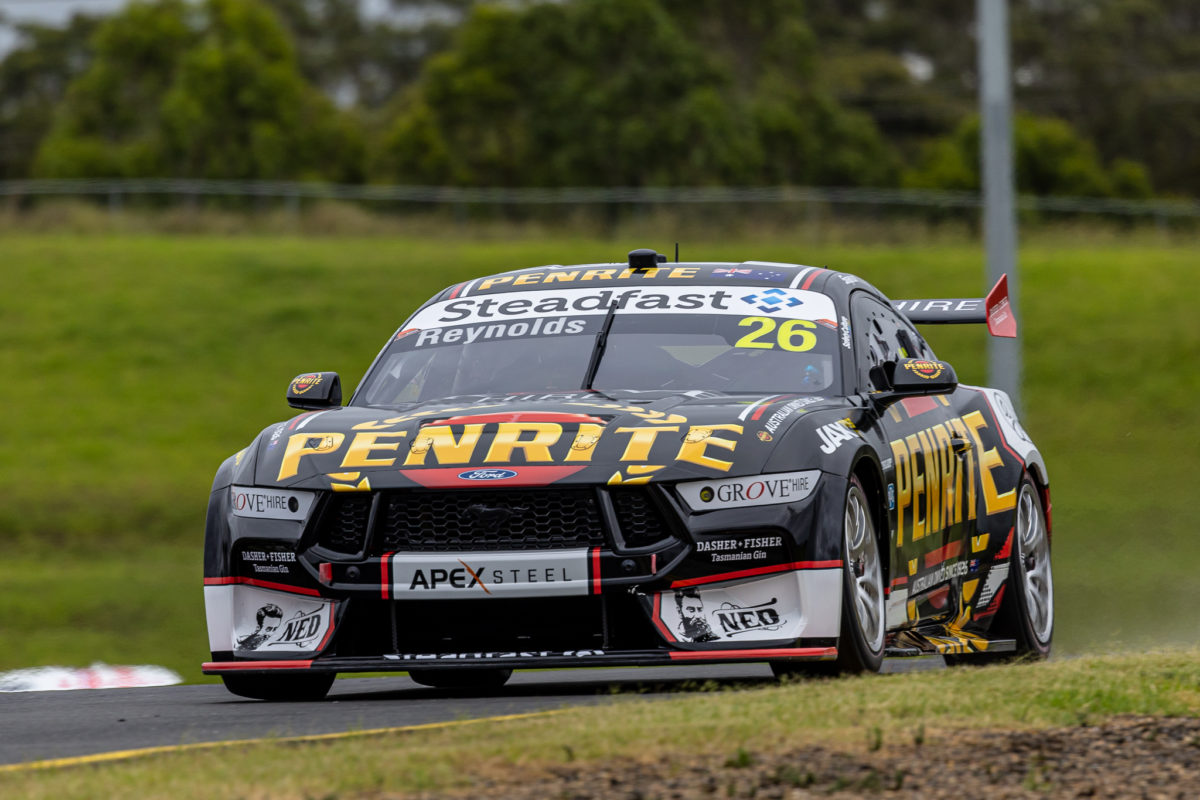

David Reynolds is fearing a “pretty dismal year” for Ford competitors as Supercars’ Gen3 parity debate rages just a fortnight out from the season-opener.
The 2017 Bathurst 1000 winner ended the official pre-season test 18th-fastest at Sydney Motorsport Park, one position behind Grove Racing team-mate Matt Payne.
The best of the Mustangs was the Blanchard Racing Team entry which Todd Hazelwood took to ninth on the timesheet with a 1:30.7131s, 1.0344s off the pace set by Brad Jones Racing’s Andre Heimgartner.
Reynolds was blunt when he gave his assessment of where the Mustang stands against the Chevrolet Camaro.
“We went into that test day and we assumed they were about a second faster,” he told SEN’s Sydney radio station.
“But, Supercars gave us a bigger restrictor so we could have a bit more engine speed and they also took a little bit of gear cut time out of the Camaro, which slows them down, down the straight, so trying to equal the difference out.
“But, that only helped about two or three tenths of a second, so there’s still like six to seven tenths of a second that we’re missing.
“So, hopefully… they’ve got two weeks to sort it out or otherwise it’s going to be a pretty dismal year for us.”
Speedcafe.com has since verified with an informed figure within Supercars that the restrictor comment is not entirely accurate, although the ‘production’ Mustang engine does have a slightly larger restrictor than that which was in the prototype car’s engines.
In any event, the engines which have been randomly assigned to the race cars have been dynamometer tested by Supercars’ engine expert, Craig Hasted, with the Engine Power Weighted Average said to be virtually identical from the Coyote-derived unit to the General Motors powerplant.
The elongation of the Camaro’s shift cut came after cars were put on a hub dyno last Friday, but, while the Mustang engine’s restrictor was not enlarged ahead of the trip to Sydney, there was a significant change to its powertrain also.
As revealed by Speedcafe.com, Supercars initiated a change to the engine calibration on the night before the test, with several Mustangs subsequently suffering throttle problems.
That could go some way to explaining the pace deficit relative to the Camaros, as would a significant weight discrepancy and the likelihood that Ford teams mostly refrained from using new tyres, as Dick Johnson Racing confirmed to Speedcafe.com.
How much can be read into the test is therefore questionable in itself, although Reynolds expressed his concern in typically colourful fashion.
“Right now, as it stands, we don’t have [parity] at all,” he declared in the same radio interview.
“We’ve got two manufacturers, the Chev and our Ford cars, and the Ford cars are probably about six to eight tenths slower which, in our game, that is literally a different sport.
“You might as well not compete with these other people because you can’t compete with them with that deficit of time.
“It’s like if you were to play a team in NRL and the other team’s allowed to take drugs and you weren’t allowed to take drugs.
“99 percent of the time, the blokes that are taking drugs are probably going to win because they’ll be fitter and stronger and do everything better, so that’s basically what we’re fighting against. We’re fighting against another car with one arm tied behind our back.
“It’s going to be a very, very difficult year, but as long as I’ve been in the sport, there’s always been some sort difference within the cars, and it’s only really been on my side of the fence where it’s actually helped me twice in my life; in 2015 when they built the FGX, and then 2018 when they built the Commodore ZB.
“Every other time I think I’ve always been on the losing side. So, it’s really not a fun time when there’s a massive, massive deficit like this; that is huge.”
Aerodynamics have also been in dispute, with the Ford camp aggrieved over what it claims is an imbalance in downforce, namely that the Mustang has too much at the front compared to the Camaro and thus too little at the rear.
Supercars has confirmed that “additional straight line evaluations” will be held next week, although it stopped short of referring to the activity as another VCAT.



















Discussion about this post